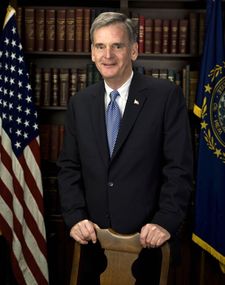Judd Gregg
| Judd Gregg | |
 |
|
|
|
|
| Incumbent | |
| Assumed office January 3, 1993 Serving with Jeanne Shaheen |
|
| Preceded by | Warren Rudman |
|---|---|
|
86th Governor of New Hampshire
|
|
| In office January 4, 1989 – January 7, 1993 |
|
| Preceded by | John H. Sununu |
| Succeeded by | Steve Merrill |
|
|
|
| In office January 3, 1981 – January 3, 1989 |
|
| Preceded by | James C. Cleveland |
| Succeeded by | Charles Douglas III |
|
Chairman of the Senate Committee on the Budget
|
|
| In office January 4, 2005 – January 3, 2007 |
|
| Preceded by | Don Nickles |
| Succeeded by | Kent Conrad |
|
Chairman of the Senate Committee on Health, Education, Labor, and Pensions
|
|
| In office January 3, 2003 – January 3, 2005 |
|
| Preceded by | Ted Kennedy |
| Succeeded by | Mike Enzi |
|
Member of the Executive Council of New Hampshire
|
|
| In office 1978–1980 |
|
|
|
|
| Born | February 14, 1947 Nashua, New Hampshire |
| Political party | Republican |
| Spouse(s) | Kathleen MacLellan Gregg |
| Children | Molly Gregg Sarah Gregg Joshua Gregg |
| Residence | Nashua, New Hampshire |
| Alma mater | Columbia University Boston University School of Law |
| Occupation | Politician Attorney |
| Religion | Congregationalist |
Judd Alan Gregg (born February 14, 1947) is a former Governor of New Hampshire and current United States Senator serving as ranking member of the Senate Budget Committee. He is a member of the Republican Party and was a businessman and attorney in Nashua before entering politics. He currently serves as the Chair of the Public Advisory Board at the New Hampshire Institute of Politics at Saint Anselm College.[1] Gregg was nominated for Secretary of Commerce in the Cabinet by President Barack Obama,[2] but withdrew his name on February 12, 2009.[3][4][5] He would be up for re-election in 2010, but has stated he will not run again.[6]
Contents |
Early life
Born in Nashua, New Hampshire, he is the son of Hugh Gregg, who was Governor from 1953 to 1955. Gregg graduated from Phillips Exeter Academy in 1965. Gregg received his baccalaureate from Columbia University in 1969 and, from Boston University School of Law, a Juris Doctor in 1972 and a Master of Laws in 1975.[7]
Early political career
The second elective office held by Gregg was a seat on the Executive Council of New Hampshire, a post which he held from 1978 to 1980. He was elected to the United States House of Representatives in 1980, and was reelected in 1982, 1984 and 1986.[8]
He declined to run for reelection in 1988, and ran for Governor of New Hampshire instead. He won that election and was reelected in 1990, New Hampshire being one of two states (Vermont is the other) that continues to elect its governors to two-year, rather than four-year, terms. As Governor he balanced the budget as he left the office in 1993 with a $21 million surplus.[9][10] Although, his political opponents in the 1990s attacked Judd for the state's weak economy and his Vietnam War deferments.[11]
U.S. Senate tenure
Elections
In 1992, Gregg decided to run for a Senate seat. He successfully defeated Democrat John Rauh, and took his seat as a United States Senator in 1993. He was reelected to a second term in 1998 after defeating George Condodemetraky, and ran for a third term. That year, 2004, he defeated campaign finance activist Doris "Granny D" Haddock, the then-94-year-old Democratic nominee, by 66% to 34%.
After withdrawing from his nomination to become United States Secretary of Commerce in the presidential administration of Democrat Barack Obama on February 12, 2009, Gregg said he would "probably not" seek reelection in 2010, when his term of office is set to expire.[12]
Leadership
In January 2005, Gregg was elected to chair the U.S. Senate Committee on Budget by the Senate Republican Conference. While chairman of this committee Gregg has been a steadfast supporter of lower spending.[13] Throughout his Senate career he has been highly supportive of lower taxes as well.
On November 14, 2008 Gregg was appointed by United States Senate Minority Leader Mitch McConnell to serve on the five-member Congressional Oversight Panel created to oversee the implementation of the Emergency Economic Stabilization Act. Gregg "stepped aside" on December 1 citing his Senate workload.
I regret that due to the impending Senate schedule involving the potential of dealing with an extremely large stimulus package, coupled with the ongoing issues of developing fiscal policy relative to the budget and the continuing economic downturn and my responsibility for foreign operations appropriations, it has become difficult to continue service on the TARP oversight board. I have advised Senator McConnell I will need to step aside from this effort.[14][15]
Platform
Republicans for Environmental Protection issued Gregg an "environmental harm demerit" for sponsoring the 2006 S.C. Resolution 83, which according to REP "included only one revenue-raising instruction to Senate appropriations committees, an abuse of the congressional budget process in order to force oil drilling in the Arctic National Wildlife Refuge", and "would perpetuate America's dangerous oil dependence and damage the most scenic, wildlife-rich reserve in the circumpolar north."[16] The organization also praised Gregg, together with John E. Sununu, for their work to pass the New England Wilderness act, which classified nearly 100,000 acres (400 km²) of New Hampshire and Vermont as wilderness.[17] In 2006, Gregg received a score of 43% from the nonpartisan League of Conservation Voters.[18]
The University of New Hampshire renamed its Environmental Technology Building Gregg Hall, because Gregg used earmarks to secure $266 million of federal funds for research and development projects for the university. The Judd Gregg Meteorology Institute (JGMI), established in 2003, is the center of meteorological and atmospheric research at Plymouth State University in Plymouth, NH, which offers the only meteorology degree program in the state. The Senator was also instrumental in the establishing of the New Hampshire Institute of Politics at Saint Anselm College in 1999.
The libertarian Cato Institute classifies Gregg as a "Free Trader", voting against trade barriers and trade subsidies 81% and 86% of the time, respectively.[19]
In 2007, Gregg voted for the CLEAN Energy Act of 2007 (H.R. 6) and the Comprehensive Immigration Reform Act of 2007 (S. 1639).
In October 2009, Gregg said "You talk about systemic risk. The systemic risk today is the Congress of the United States...we’re creating these massive debts which we’re passing on to our children...(the figures) mean we’re basically on the path to a banana republic-type of financial situation in this country.[20] "
Gregg has a moderate record on social issues. In June 2006 he joined six of his fellow Republicans in voting against the Federal Marriage Amendment. In April 2007 he was among the breakaway Republicans to support the Stem Cell Research Enhancement Act. However, his record on the issue of abortion is a solidly pro-life one. Gregg has voted for some gun control measures and against others. He voted against the Brady Bill, but in recent years has voted for trigger control locks on firearms and in favor of the ban on assault weapons.
On December 17th, 2009, Gregg voted to extend Chairman Ben Bernanke's term.[21]
Presidential politics
During the 2004 Presidential Election, Gregg stood in for John Kerry during practice sessions held by George W. Bush in preparation for the 2004 United States Presidential Election Debates. Four years earlier he had played the part of Al Gore for the same purpose.
On October 29, 2007, Gregg endorsed Mitt Romney, former Governor of Massachusetts, to be the Republican nominee for President of the United States.
Controversies
In the Senate Gregg was the leading Republican negotiator and author of the TARP program, which bailed out financial institutions, while he had a multi-million dollar investment in the Bank of America.[22][23][24]
In February 2009, the Associated Press reported that Gregg and his family profited personally from federal earmarks steered by the senator for the redevelopment of the closed Pease Air Force Base.[25] Gregg has denied any wrongdoing, and claimed his withdrawal for the Cabinet position had nothing to do with what the White House found about his involvement with the real estate companies during the vetting process. Gregg explained his investments by saying, "I've throughout my entire lifetime been involved in my family's businesses and that's just the way our family works. We support each other and our activities."[26]
Committees
- Committee on the Budget (Ranking Member)
- Committee on Banking, Housing, and Urban Affairs
- Subcommittee on Housing, Transportation, and Community Development
- Subcommittee on Financial Institutions
- Subcommittee on Securities, Insurance, and Investment
- Committee on Appropriations
- Subcommittee on Commerce, Justice, Science, and Related Agencies
- Subcommittee on Defense
- Subcommittee on Homeland Security
- Subcommittee on Interior, Environment, and Related Agencies
- Subcommittee on Labor, Health and Human Services, Education, and Related Agencies
- Subcommittee on State, Foreign Operations, and Related Programs (Ranking Member)
- Committee on Health, Education, Labor, and Pensions
- Subcommittee on Children and Families
- Subcommittee on Retirement and Aging
Commerce Secretary nomination and withdrawal
On February 2, 2009, Politico and CNN reported that Gregg accepted President Obama's offer to be the next United States Secretary of Commerce.[27] If Gregg had been confirmed by the Senate, he would have had to resign his Senate seat and be replaced with an appointment by Democratic Governor John Lynch. Sources from both parties confirmed that Gregg's former chief of staff, Republican Bonnie Newman, would have been chosen to replace him.[28] The Washington Post had alleged that Gregg would not accept the appointment unless Gov. Lynch agreed to appoint a Republican to fill his seat until 2010.[29] In February 2009 many news outlets noted that Gregg had, in 1995, voted to abolish the United States Department of Commerce.[30] Although he has stated that he supports the stimulus package promoted by President Obama, he has stated that he will recuse himself from voting on the package.[31]
With reports that the Obama administration would move the United States census, typically run by the Commerce Department, out of Gregg's jurisdiction, Republican leaders urged Obama to allow Gregg to run the census or withdraw Gregg's nomination.[32] On February 12, 2009, Gregg withdrew his name from consideration for the position of United States Commerce Secretary, citing disagreements with issues surrounding the census and the stimulus plan.[33] White House Press Secretary Robert Gibbs issued a statement regarding Gregg's withdrawal in which he accused the senator of not following through on his alleged statements of support for Obama's economic agenda made during the vetting process:[34]
Senator Gregg reached out to the President and offered his name for Secretary of Commerce. He was very clear throughout the interviewing process that despite past disagreements about policies, he would support, embrace, and move forward with the President's agenda. Once it became clear after his nomination that Senator Gregg was not going to be supporting some of President Obama's key economic priorities, it became necessary for Senator Gregg and the Obama administration to part ways. We regret that he has had a change of heart.
While speaking to press afterward, Gregg acknowledged responsibility for his decision and accepted the blame for accepting and then rejecting the Commerce Secretary nomination.[12]
In an interview response to the AP, Gregg was quoted as saying, "For 30 years, I've been my own person in charge of my own views, and I guess I hadn't really focused on the job of working for somebody else and carrying their views, and so this is basically where it came out."[35]
Personal life
Gregg belongs to the Congregationalist Church. He is married to Kathleen MacLellan Gregg; the couple have two daughters, Molly and Sarah, and a son, Joshua.
Gregg won more than $850,000 in 2005 after buying $20 worth of Powerball tickets at a Washington, D.C. convenience store.[36]
Electoral history
References
- ↑ "New Hampshire Institute of Politics : Saint Anselm College". Anselm.edu. http://www.anselm.edu/nhiop/about/public+advisory+board/. Retrieved 2010-08-23.
- ↑ Sidoti, Liz (February 3, 2009). "Obama names Gregg Commerce secretary". Associated Press. http://hosted.ap.org/dynamic/stories/O/OBAMA_COMMERCE?SITE=MITRA&SECTION=HOME&TEMPLATE=DEFAULT. Retrieved 2009-02-03.
- ↑ "BREAKING: Gregg withdraws". CNN. http://politicalticker.blogs.cnn.com/2009/02/12/breaking-gregg-withdraws-from-consideration-for-commerce-post/#more-39861. Retrieved May 7, 2010.
- ↑ [1]
- ↑ Gregg withdraws from consideration for Commerce post
- ↑ J. Taylor Rushing (April 1, 2009). "Gregg says he definitely won't run again". The Hill. http://thehill.com/campaign-2008/gregg-not-convinced-to-run-again-2009-04-01.html.
- ↑ "Judd Gregg (R-N.H.) - WhoRunsGov.com/The Washington Post". Whorunsgov.com. 2010-02-12. http://whorunsgov.com/Profiles/Judd_Gregg. Retrieved 2010-08-23.
- ↑ Biographical Directory of the United States Congress
- ↑ "Gregg leads in N.H.; Merrill is a winner". Pqasb.pqarchiver.com. 1992-11-04. http://pqasb.pqarchiver.com/boston/access/61882763.html?dids=61882763:61882763&FMT=ABS&FMTS=ABS:FT&type=current&date=Nov+04%2C+1992&author=Laura+A.+Kiernan%2C+Globe+Staff&pub=Boston+Globe+%28pre-1997+Fulltext%29&desc=Gregg+leads+in+N.H.%3B+Merrill+is+a+winner&pqatl=google. Retrieved 2010-08-23.
- ↑ http://news.google.com/newspapers?id=WAogAAAAIBAJ&sjid=K2UFAAAAIBAJ&pg=1654,298140&dq=judd+gregg&hl=en
- ↑ "THE NEW SENATORS // Republican Gregg has roots in politics". Pqasb.pqarchiver.com. 1992-11-05. http://pqasb.pqarchiver.com/USAToday/access/56238946.html?dids=56238946:56238946&FMT=ABS&FMTS=ABS:FT&type=current&date=Nov+05%2C+1992&author=Dennis+Cauchon&pub=USA+TODAY+%28pre-1997+Fulltext%29&desc=THE+NEW+SENATORS+%2F%2F+Republican+Gregg+has+roots+in+politics&pqatl=google. Retrieved 2010-08-23.
- ↑ 12.0 12.1 'I couldn't be Judd Gregg'
- ↑ The Creative Stubbornness of Harry Reid - TIME
- ↑ Judd Gregg (December 2, 2008). "Gregg comments on departure from tarp oversight panel". Press release. http://gregg.senate.gov/public/index.cfm?FuseAction=PressRoom.PressReleases&ContentRecord_id=f864bab4-802a-23ad-416d-25eda09fcd75&Region_id=&Issue_id=. Retrieved 2009-02-14.
- ↑ Lawson, Brian (December 2, 2008). "Gregg comments on leaving bailout committee". Politicker. http://www.politicker.com/new-hampshire/14700/gregg-comments-leaving-bailout-committee. Retrieved 2009-02-14.
- ↑ Republicans for Environmental Protection 2006 Scorecard
- ↑ ibid
- ↑ League of Conservation Voters 2006 Scorecard
- ↑ Free Trade, Free Markets: Rating Congress
- ↑ "Gregg: U.S. could be on path to a 'banana republic' situation". CNN. http://politicalticker.blogs.cnn.com/2009/10/18/gregg-u-s-could-be-on-path-to-a-banana-republic-situation/. Retrieved 2009-10-19.
- ↑ [2]
- ↑ http://pfds.opensecrets.org/N00000444_2007.pdf
- ↑ Zajac, Andrew (February 4, 2009). "Commerce Nominee's Own Finances Have Suffered". Chicago Tribune.
- ↑ "Gregg: Bailout Isn't Just An Exercise in Political Ideology". The Hill. 2008-09-28. http://thehill.com/blogs/blog-briefing-room/news/legislation/41995-gregg-bailout-isnt-just-an-exercise-in-political-ideology. Retrieved 2009-10-04.
- ↑ "AP: Gregg had stake in, won aid for base". WBZ. Associated Press. 2009-02-27. http://www.wbz.com/pages/3932835.php?. Retrieved 2009-07-30.
- ↑ Sharon Theimer (February 27, 2009). "Gregg had stake in, won aid for base". Associated Press. http://www.google.com/hostednews/ap/article/ALeqM5iNbrnUBpDY517FaoDzHF5oEBCRnwD96JQDR80.
- ↑ Rogers, David (February 2, 2009). "Obama picks Gregg for Commerce". Politico. http://www.politico.com/news/stories/0209/18325.html. Retrieved 2009-02-03.
- ↑ Henry, Ed; King, John (February 3, 2009). "GOP's Gregg accepts commerce secretary post". CNN. http://www.cnn.com/2009/POLITICS/02/02/judd.gregg.commerce/index.html. Retrieved 2009-02-03.
- ↑ Cillizza, Chris (January 30, 2009). "White House Cheat Sheet: Bantering Over Bipartisanship". Washington Post. http://voices.washingtonpost.com/thefix/2009/01/white_house_cheat_cheet_banter.html?hpid=topnews. Retrieved 2009-01-30.
- ↑ Jackson, David (February 3, 2009). "His terms met, Gregg says yes to Commerce". USA Today. http://www.usatoday.com/news/washington/2009-02-03-gregg_N.htm. Retrieved May 7, 2010.
- ↑ "Gregg declines to cast any votes in Senate - The Boston Globe". Boston.com. 2009-02-07. http://www.boston.com/news/nation/washington/articles/2009/02/07/gregg_declines_to_cast_any_votes_in_senate/. Retrieved 2010-08-23.
- ↑ O'Keefe, Ed (2009-02-12). "Republicans Continue to Hammer White House Over Census". WashingtonPost.com. http://voices.washingtonpost.com/federal-eye/2009/02/republicans_ask_obama_to_recon.html. Retrieved 2009-02-12.
- ↑ Gregg Withdraws as Commerce Nominee Washington Post, February 12, 2009
- ↑ White House Statement on Gregg Withdrawal
- ↑ Sidoti, Liz; Espo, David (February 12, 2009). "Gregg withdraws as commerce secretary nominee". Associated Press. http://news.yahoo.com/s/ap/20090212/ap_on_go_ca_st_pe/gregg_withdrawal. Retrieved 2009-02-12.
- ↑ Kornblut, Anne E. (2008-02-01). "GOP's Gregg Appears To Be Commerce Pick". Washington Post. http://www.washingtonpost.com/wp-dyn/content/article/2009/01/31/AR2009013101782.html.
External links
- U.S. Senator Judd Gregg official U.S. Senate site
- Biography at the Biographical Directory of the United States Congress
- Voting record maintained by The Washington Post
- Biography, voting record, and interest group ratings at Project Vote Smart
- Biography at WhoRunsGov.com at The Washington Post
- Congressional profile at GovTrack.us
- Appearances on C-SPAN programs
- Issue positions and quotes at On The Issues
- Financial information at OpenSecrets.org
- Staff salaries, trips and personal finance at LegiStorm.com
- Campaign finance reports and data at the Federal Election Commission
- Collected news and commentary at The New York Times
- Profile at SourceWatch
- Gregg as governor at New Hampshire's Division of Historic Resources
- Environmental Technology building named for Senator Gregg – The New Hampshire
- Judd Gregg Meteorology Institute
| Political offices | ||
|---|---|---|
| Preceded by John H. Sununu |
Governor of New Hampshire 1989–1993 |
Succeeded by Steve Merrill |
| Preceded by Edward Kennedy |
Chairman of the Senate Health, Education, Labor and Pensions Committee 2003–2005 |
Succeeded by Michael Enzi |
| Preceded by Don Nickles |
Chairman of the Senate Budget Committee 2005–2007 |
Succeeded by Kent Conrad |
| United States House of Representatives | ||
| Preceded by James C. Cleveland |
Member of the U.S. House of Representatives from New Hampshire's 2nd congressional district 1981–1989 |
Succeeded by Charles Douglas III |
| United States Senate | ||
| Preceded by Warren Rudman |
United States Senator (Class 3) from New Hampshire January 3, 1993 – present Served alongside: Robert C. Smith, John E. Sununu, Jeanne Shaheen |
Succeeded by Incumbent |
| United States order of precedence | ||
| Preceded by Barbara Boxer D-California |
United States Senators by seniority 28th |
Succeeded by Russ Feingold D-Wisconsin |
|
||||||||||||||
|
|||||||||||||
|
|||||||
|
||||||||||
|
||||||||||||||
|
|||||||||||||

